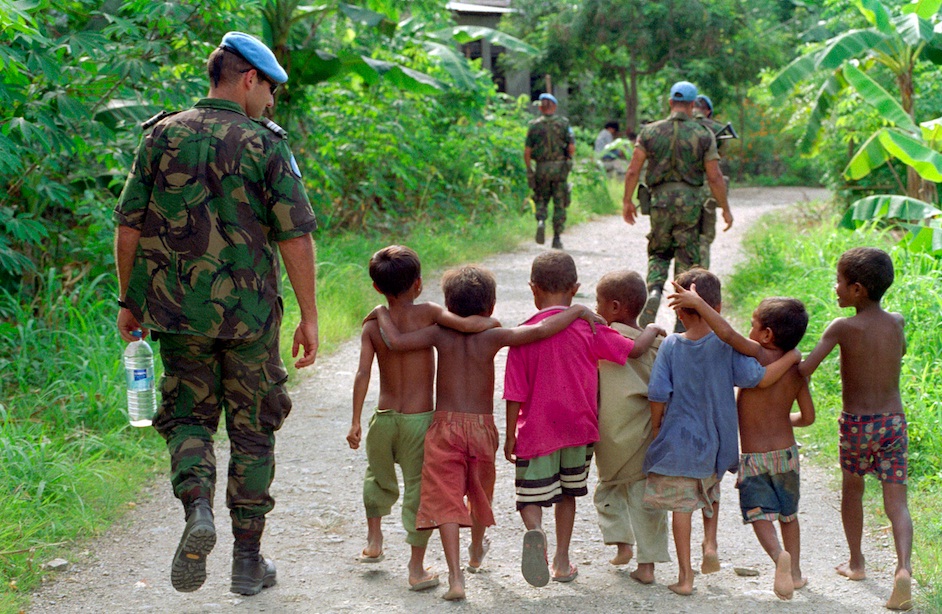Protection of civilians - Women’s participation in peace operations is key to protection (01/30/2015) [fr]
Protection of civilians in armed conflict: "Protection challenges and needs faced by women and girls in armed conflict and post-conflict settings" - Statement by Mr. Alexis Lamek, Deputy Permanent Representative of France to the United Nations - Security Council - 30 January 2015

I would first like to thank you, Mr. President, for organizing this
debate on the eve of a number of deadlines for crucial upcoming efforts such as the strategic reviews of peace operations, the women and peace and security agenda and the United Nations peacebuilding architecture. I would also like to acknowledge the commitment of the agencies of the United Nations and the Office for the Coordination of Humanitarian Affairs, the International Committee of the Red Cross and the non-governmental organizations working in difficult conditions, whose experience in the field, as we just heard in the briefings, is clearly essential.
The numbers of all the countries and all the violent acts committed in them against civilians, including thousands of women and girls, are unfortunately too many to list. Those facts are not just statistics, they are a reality that we must work to change through better protection of civilians. How can that be done? There are four types of action that can be taken, particularly in areas where peacekeeping operations are deployed. The first is by protecting the people living within conflict zones. That sounds obvious, but too often the Blue Helmets’ attitude lacks the dynamism and mobility needed to ensure a successful mission. We expect the review of peace operations to take that reality into account. The United Nations Multidimensional Integrated Stabilization Mission in Mali has a robust mandate for the protection of civilians that it is fulfilling in difficult conditions. It is vital to ensure that the United Nations Multidimensional Integrated Stabilization Mission in the Central African Republic reaches its full operational capability by April, as planned, and that it adopts a robust posture in implementing its mandate.
Secondly, we must guarantee that protection within peace operations themselves. Unfortunately, 10 years after the publication of Prince Zeid’s report on sexual abuse and exploitation in peacekeeping operations (A/59/710), crimes continue to be committed by those charged with protecting civilians, including, by the way, in regional operations such as the African Union Mission in Somalia, which has been denounced by Human Rights Watch. In order to prevent such abuses, we must act on two levels — first, by strictly enforcing zero tolerance and filtering policies designed to prevent troops, soldiers and officers who commit such acts from participating in peacekeeping operations, and secondly, by punishing and prosecuting those responsible. The United Nations cannot afford to be impugned for its actions; its missions and operations must serve as examples.
Thirdly, I would like to emphasize the importance of preventive and complementary actions for the protection of civilians. To begin with, the participation of women makes operations on the ground more effective to the degree that they are involved in devising strategies for protecting civilians. For example, they can help to design camps and protection sites so as to better meet their needs in terms of secure access to services and basic infrastructure. Women’s participation in peace operations is also a way for peacekeepers to have a closer relationship to local communities and thus win their trust, which is clearly essential to protection. The United Nations Organization Stabilization Mission in the Democratic Republic of the Congo, for example, works closely with local stakeholders to support victims of sexual violence and recruitment by armed groups, and such practices should be followed throughout the Organization.
Then there is prevention. It is vital that within human-rights sections, teams of human rights, gender and protection counsellors should be effective and well coordinated, in order to enable them to assess whatever threats are present through accurate analysis of the data on women and children’s human rights and then to sound the alarm and avoid any deterioration of the situation. Regarding sexual violence, training is essential and must be carried out to benefit both those involved in peacekeeping operations and the local populations, in order to reduce the social stigma for the victims.
Fourthly and finally, there can be no protection without justice. The confirmation on 1 December 2014 of the International Criminal Court’s indictment of the warlord Thomas Lubanga for war crimes and, more recently, the transfer to the Court in January of Dominic Ongwen, a commander in the Lord’s Resistance Army, are important steps in combating impunity for violence against civilians, most of them women and girls. But most acts of violence, particularly sexual violence, go unpunished, often because women refuse to complain for fear of repercussions. That is why we must also ensure that victims are protected when they bring legal action against the perpetrators of such crimes. We must break the chain of silence through protection.